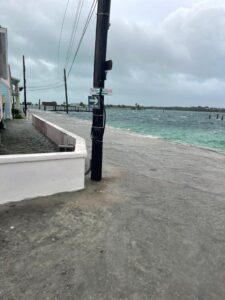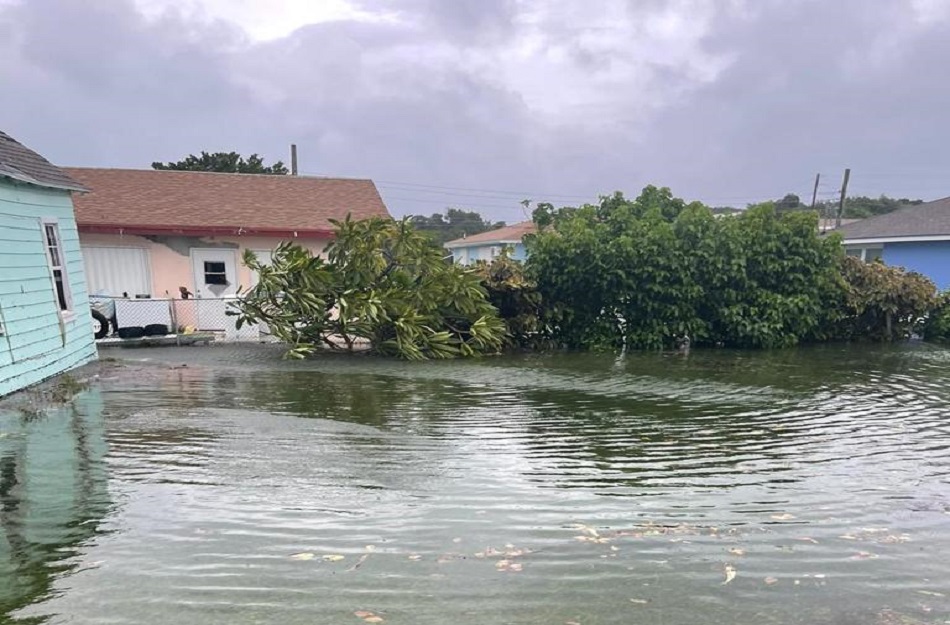By Deandre Williamson
Caribbean Climate Justice Journalism Fellow
#TheBahamas, November 29, 2022 – With the trauma of Hurricane Dorian still lingering, Abaco and Grand Bahama residents braced for Hurricane Nicole as they experienced another unfair blow of climate injustice.
As sea levels rose, triggering storm surges and flooding, the northwestern islands of The Bahamas were placed under hurricane watch. For many, this signaled that the fight for climate justice must continue.
Some residents on those islands evacuated their homes and fled to shelters hours before Nicole made landfall in The Bahamas on Nov. 9 as a tropical storm and strengthened to a Category 1 hurricane with winds up to 75 miles per hour.
“The wind was manageable. It wasn’t as bad as we thought. In our area we got maybe a limb or so that blew down. The power was out for a while, but thank God, we made it through it,” Abaco resident Mark Anthony Swain said.
Although the impact of Hurricane Nicole was minimal when compared to Hurricane Dorian in 2019, climate change is the underlying cause of the intensity and frequency of hurricanes in recent years.
When Nicole exited The Bahamas, the “all clear” was given, but the country isn’t clear from future hurricanes and the devastating effects of climate change.
However, it’s clear that The Bahamas and other Small Island Developing States (SIDS) need climate justice because they are hit hardest by the impact of climate change, are the least responsible and together bear next to no responsibility for the climate crisis.
responsibility for the climate crisis.
While the Government of The Bahamas is fighting for climate justice, residents of Abaco and Grand Bahama are calling for more to be done to mitigate the impact of climate change.
Swain, who also experienced Hurricane Dorian, said the countries that are major contributors of carbon emissions in the atmosphere should do more to assist smaller countries in fighting climate change, so when hurricanes and other natural disasters occur, the smaller countries will be able to maintain themselves.
“I think these other countries that are contributing to the climate challenge that we are facing should be held responsible and accountable in that regard,” Swain added.
China, the United States, Russia, India and Japan are the top five countries with the highest carbon emissions in the world.
Grand Bahama resident Randy Deleveaux, who was on the island during Hurricane Nicole, agrees that more should be done concerning the climate crisis because The Bahamas is in a hurricane zone based on its geographical location.
“We know that every year rain, sun or shine, it appears as if we are going to have a hurricane, whether it’s a major one or not a major one,” Deleveaux said. “As a matter of fact, even though the ones we consider not major, we still have to take more necessary precautions because Dorian taught us we can’t take nothing for granted.”
Deleveaux suggested that the government should ensure that every household is equipped with storm shutters, floatation devices and life jackets.
“There are so many things that the government can do and persons can do in relation to hurricanes because we always have to prepare,” he added.
“Every time we have a hurricane coming, persons have to run and scrap for plywood to put on their windows. We need to move from that and be able to properly prepare.
“Look at our coastal erosion and stuff like that because of the hurricanes. I remember one time you could go on the beaches and see sand, now some of these beaches don’t have no sand like that because of hurricanes and we’re not even looking at the impact that is having on our coastal and marine life. We don’t replace the sand. There is so much things we can do.”
Loss and Damage
But no matter how large or small a hurricane measures on the Saffir-Simpson Scale, there is always loss and damage associated with a storm.
According to Prime Minister of The Bahamas Philip Davis, during the Caribbean Regional Heads of Government Meeting in Preparation for COP27, more than 50 percent of The Bahamas’ outstanding debt can be linked to the impacts of the hurricanes between 2015 and 2019.
The Inter-American Development Bank (IDB), in its damage and loss assessments (DaLA) synthesis, noted that The Bahamas has lost more than $4.2 billion over the past seven years as a result of Hurricanes Joaquin, Matthew, Irma and Dorian.
Abaco and Grand Bahama are still rebuilding from Hurricane Dorian and, although minimal, the damages from Hurricane Nicole are being assessed.
Prime Minister Davis was in Sharm El-Sheikh, Egypt attending COP27 when Hurricane Nicole passed through the northwestern Bahamas. At COP27, he called on world leaders to get real about ensuring that loss and damage are compensated for.
northwestern Bahamas. At COP27, he called on world leaders to get real about ensuring that loss and damage are compensated for.
“We do not have a significant carbon footprint in the world. Yes, we do have a significant carbon sink in the world. But yet still, after this hurricane has passed, who’s going to have to pay for the recovery, reconstruction and for normalizing the lives of my people?” Davis said in a video interview.
Climate justice fights for solutions to the climate crisis that would result in reduced emissions and industrialized rich nations sharing the burden of the crisis by helping SIDS handle the severe effects of climate change.
Swain lost his home during Hurricane Dorian and there are others who also lost their homes and some are still living in trailers in Abaco.
Without insurance, Swain is rebuilding his home, but the progress is slow.
He explained that the Disaster Reconstruction Authority and other NGOs promised to help him, but they haven’t delivered on their promises as yet.
“We will, out of pocket, try to do some things to get us along,” Swain said.
Hurricane Dorian caused a housing shortage in Abaco and the demand for a home is great.
According to Swain, because of the demand and desperation to find a home, the rent in Abaco is skyrocketing.
“You can find the average apartment, two bedroom, going for no less than $1,500. In some instances it’s over $2,000,” he said.
After negotiations and hearing the pleas of Small Island Developing States, COP27 closed with the announcement of a loss and damage fund to compensate countries impacted by climate change. This is a huge step in the fight for climate justice.
This story was published with the support of Climate Tracker’s Caribbean Climate Justice Journalism Fellowship.
Deandre Williamson
Journalist
Member, The Bahamas Press Club 2014
Caption: Flooding in Abaco caused by Hurricane Nicole. (Photo/Abaco resident)


 Caribbean News7 days ago
Caribbean News7 days ago
 Caribbean News7 days ago
Caribbean News7 days ago
 Caribbean News1 week ago
Caribbean News1 week ago
 Caribbean News7 days ago
Caribbean News7 days ago
 Bahamas News7 days ago
Bahamas News7 days ago
 News7 days ago
News7 days ago
 Bahamas News1 week ago
Bahamas News1 week ago
 News7 days ago
News7 days ago















